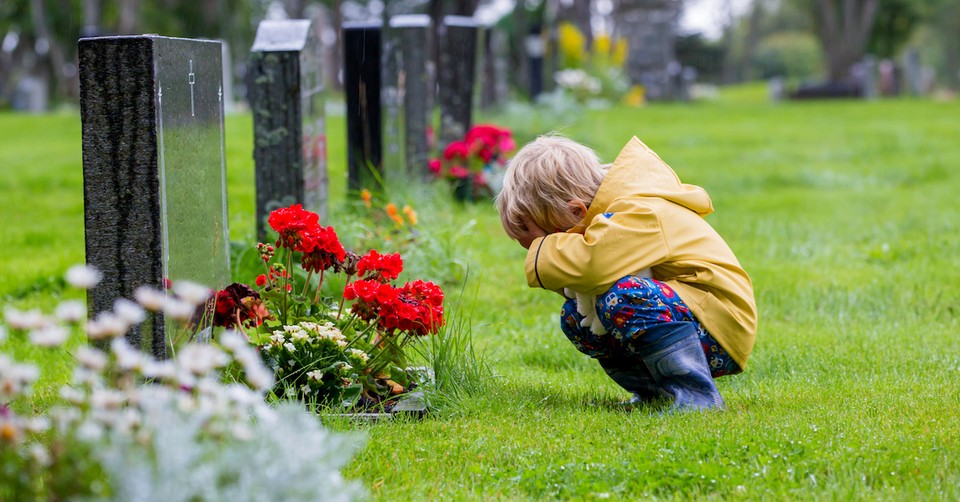How to Explain Death to Your Children

Death is hard. Even as Christians who believe in eternal life, death can be difficult. Death can also seem like a complex topic to discuss with your children, but while there are times to shield them from death and dying, we should prepare them to face what happens to every living creature here on earth.
However, finding the right words or time to talk about death can seem insurmountable, especially when you might be struggling with your own grief. How can we explain death to our children? Here are my suggestions.
Don't shield them from death.
Our kids recognize the life cycle of plants, animals, and humans much sooner than we think. While we might need not let our kids experience the full impact of dying, we shouldn't be afraid to let them experience death in age-appropriate ways. For example, when possible, allow a pet to pass at home. We were able to do this with one of our cats, who got very sick but wasn't in any pain. At 20 years old, each of our four children had always known Goliath as part of the family. We were able to have many conversations about his death, and they were able to care for him and love him as he steadily declined. It was a very sad time, but in many ways, it was also good for my children to experience death in our home safely.
Use simple language.
Don't overcomplicate matters but talk to your kids using clear, direct language. Also, avoid euphemisms, such as passed away or gone, at least initially, because those words can be difficult for children to comprehend, especially if they're young. It's hard to say the words "died" or "dead," but it will help our children if we use those words when imparting the news.
Don't be afraid to let them see your grief.
When we have to impart the news about the death of a beloved pet or family member, it's okay for them to see you cry or be sad. It's also good for them to see that your grief is not over in an instant but lingers on for some time. Seeing you work through grief can help them view it as a process rather than a one-time feeling.
For example, a few months after my father died from Alzheimer's, one of my boys chipped off a piece of wood from a bookcase he'd built for my 12th birthday. I'd always treasured the piece of furniture, but doubly so now that my father was gone from this earth. I became very upset when I saw the damage and later explained to my son it made me really sad to see the minor scrape on the bookcase because my dad was in heaven. I also told my son sometimes grief sneaks up on you at odd times and makes you miss the person acutely and that this was one of those times.
Start early.
Death is part of life. Every living creature, from plants and trees to animals to human beings, eventually dies. The sooner we acknowledge that with our children, the better. This doesn't mean we shoehorn death into conversations, but we shouldn't shy away from the topic, no matter the child's age.
Tell them what to expect.
What happens after death can be mysterious to our children, whether it's a family pet or a family member. We need to demystify the process for them by walking them through what happens next.
For example, if your pet dies at the vet's, a natural question would be, what happens to Fluffy's body? Two of our cats died at the vet's, and we chose not to retrieve their bodies for burial (we planted a pussy willow tree in our backyard to remember the cats). One of our cats died at home, and we buried him in our backyard while our children were at school. Later, we showed our kids the spot.
When my father died, we talked about the funeral, from when and where it would be, how he would be buried (in a closed casket), and what would happen at the church and graveside services, including how he would be honored for his 20 years of service in the US Air Force. We wanted them to have that knowledge ahead of time to help ease any anxiety they might have had on the day of the funeral.
Label feelings for them.
Kids might not know what to feel when they hear a loved one has died, so maybe say, "I know you're sad about grandpa dying. We loved him so much it hurts our hearts that he's gone." Share your own feelings with them when appropriate, which will help them process the loss.
Allow them space to grieve. Children and teens might not appear to be as impacted by death as we are, as the feelings of grief might be foreign to them. Give them time to process it and check in with them from time to time about their feelings. Don't make them feel guilty for not crying more or feeling sad. We all grieve in different ways, so don't pressure them to react as you do.
Invite questions.
While you want to relay the news directly, your child or teen will likely have more questions as they work through the death. Be open to answering the questions no matter how insensitive or strange you might find them. Don't be surprised if the questions come weeks or months after the loss, as sometimes, children take a while to work through their thoughts on big topics.
Talk about heaven often.
As Christians, we should be discussing what happens when someone dies before someone our child knows dies. Heaven should be a regular topic of conversation around the dinner table so our children have an understanding of eternal life before someone they love passes away. But also, be sure to say there's a lot about heaven we don't know. For example, when our first cat died, our kids wanted to know if cats go to heaven. The Bible isn't clear on the subject, so we talked about how much God loved us and gave us pets here on earth to bring us joy, so we wouldn't be thinking wrong to believe there could be pets in heaven.
Discuss the fall and its implications.
The reason we die is because of the fall in the Garden of Eden. Death was introduced when Adam and Eve ate the fruit from the serpent. But don't end there! Ground their understanding of death in the good news of the Gospel. Jesus came to earth to redeem death for us, to give us life eternal with him. We can't discuss death without discussing eternal life with our Savior too.
Help them remember.
Our kids might not know how to talk about death or the person or pet who has died. You'll need to guide them through the remembering, especially if they were young when the grandparent passed, for example. Let them see that speaking about the person who is no longer with us simultaneously makes us sad and happy—that curious bittersweetness known to humans. On special days, like the person's birthday or wedding anniversary, mark it by talking about the person. Share funny stories and silly memories. Talk about their faith or service to their country, if applicable. Look through old photo albums or ask someone who was close to the person for their recollections.
Death comes to each of us, and inviting conversations about our eventual demise is both prudent and healthy for our children to help them learn not to fear death. As the Apostle Paul put it in 1 Corinthians 15:55-57, "O death, where is your victory? O death, where is your sting? The sting of death is sin, and the power of sin is the law. But thanks be to God, who gives us the victory through our Lord Jesus Christ" (ESV).

Originally published October 11, 2022.





